You’ll hardly need reminding that next year is the 200th anniversary of the birth of Charles Darwin, and the 150th anniversary of his best known work – On The Origin of Species. It’s already a big deal: special events, new book editions, talks, tee-shirts, diaries, calendars, and commemorative mugs – the lot. And rightly so – however we might nuance the term, there would be no Darwinism without Darwin. But as the celebrations bubble up to a crescendo of reverence on February 12th, I wonder if the world will spare a thought for Darwin’s own origins, and particularly his illustrious grandfather – Erasmus (1731-1802). He’ll certainly be struggling for attention, so consider this a pre-emptive strike on behalf of The Other Darwin Genius.
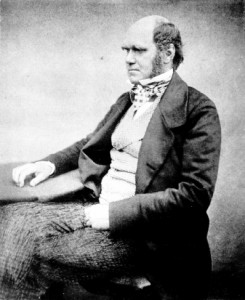
We automatically associate ‘Darwin’ with the name ‘Charles’. A mention of Erasmus in conversation brings blank looks, even from devotees of the definitive Charles. Genius twice in the same family – impossible! And if the old fellow had some notoriety in his day, surely it must pale beside that of his grandson.Yet Erasmus is not to be compared to Charles in any competitive sense. Their skills, inclinations, personality, temperament, and achievements were very different. It was their shared inquisitiveness and intellectual energy that destined each to leave a lasting imprint on the world. We all know about Charles’s lasting imprint, but few are aware that Erasmus was:
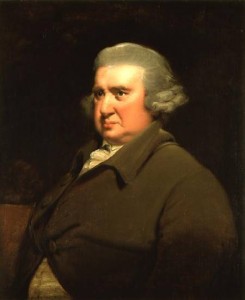
- The greatest physician of his time
- An original and popular poet
- A respected scientist and inventor
- A key player and catalyst in the industrial revolution
His life has been richly documented by physicist Desmond King-Hele, whose analysis reveals a breathtaking range of interests, involvements and achievements. Not associated with one single big theory or event, Erasmus confuses our conception of the traditional achiever. Charles by contrast is easy – well and truly Mr Evolution. So what makes Erasmus so appealing?
His lifelong profession was medicine. Widely recognised in England as the top doctor of his day, he famously declined to be King George III’s personal physician. (Had he accepted of course, George’s porphyria would have quickly cleared up, the King’s eye would have stayed on the political ball, and America would still be ours – yippee! Well, O.K. – maybe not; Erasmus’s sympathies actually tended towards the pro-revolutionary.) He chose rather to spread his benefaction widely, making house calls to ordinary folk in all weathers and treating the poor for free.
Erasmus’s medical knowledge is captured in the 1796 ZOONOMIA. At 5kg, the big and heavy first edition makes fascinating reading. Some of the 18th century cures sound worse than the diseases, but while Erasmus’s use of the blood-letting lancet for physical conditions may have been typical, his approach to mental disease was ahead of its time. Lunatics in his care could expect compassion instead of the more familiar beating.
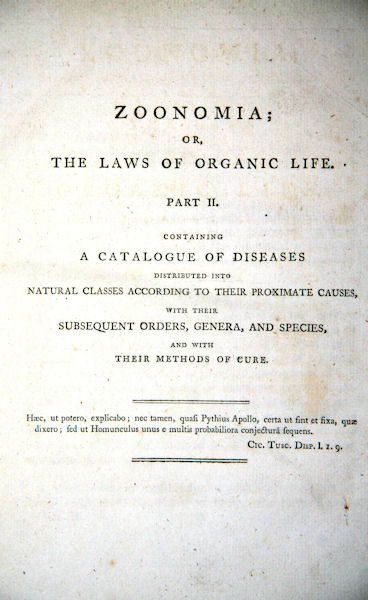
Charles inherited his knack for ruffling religious feathers from his grandfather, who in Zoonomia classified religion as a mental disease – a ‘Desease of Volition’. Here he dismisses it along with other fantasies in a discussion on Credulitas, or Credulity. To get a flavour of the language and its appearance, the reader is invited to struggle through this photocopy of the original text:
[text continues]………
In regard to religious matters, there is an intellectual cowardice instilled in the minds of the people from their infancy; which prevents their inquiry: credulity is made an indispensible virtue; to inquire or exert their reason in religious matters is denounced as sinful; and in the catholic church is punished with more severe penances than moral crimes…
For each desease, Darwin offers a cure. Headed ‘M.M.’ for Materia Medica, his wise council on credulity reads:
M.M. The method of cure is to increase our knowledge of the laws of nature, and our habit of comparing whatever ideas are presented to us with those known laws, and thus to counteract the fallacies or our senses, to emancipate ourselves from the false impressions which we have imbibed in our infancy, and to set the faculty of reason above that of imagination.
Rational thinking and appeal to scientific method shine through – not surprising given the very interesting people Erasmus was mixing with: James Watt and Matthew Boulton of steam engine fame, Josiah Wedgwood of pottery fame, the Scottish chemist James Kier, and the politically animated chemist and co-discoverer of oxygen Joseph Priestley.
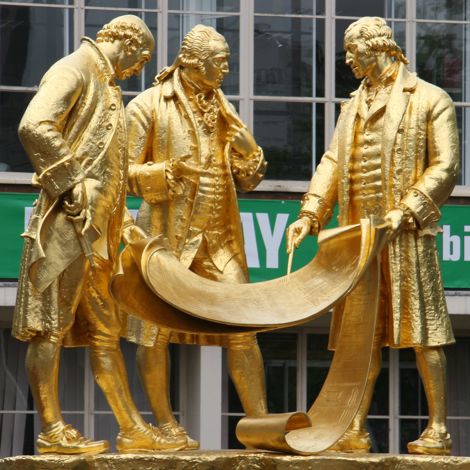
With Erasmus’s support, Wedgwood got England’s first canal built, while his friendship and technical exchanges with Watt and Boulton catalysed the steam age. Together known as the Lunar Men, (so called because they travelled to monthly meetings assisted by moonlight) this group drove the industrial revolution and gave us the roots of our technological world.
A pioneering scientist and engineer in his own right, Erasmus is unsung in many fields. He discovered ‘Charles Gas Law’ before Charles -who claimed it 24 years later, glimpsed partial pressures ahead of Dalton, and explained how clouds form. His musings appear almost casually in a letter to Boulton, where we first learn that his plans for weather forecasting will be enhanced by the accuracy of John Harrison’s new clock – that is Harrison of longitude fame (this single letter is astonishing in the icons it embraces), then:

I am extremely impatient for this Play-Thing! [Harrison’s clock] as I intend to fortell every Shower by it, and make great medical discovery as far as relates to the specific Gravity of Air: and from the Quantity of Vapor. Thus the Specific Gravity of the Air, should be as the Absolute Gravity (shew’d by the Barometer) and as the Heat (shew’d by Boulton’s Thermometer). Now if it is not always found as these two (that is as one and inversely as the other) then the deviations at different Times must be as the Quantity of dissolved Vapour in the Air.
Elsewhere in the same letter, having playfully struck Boulton off as a “plodding man of Business” he proceeds to bribe him with wine on the condition he glass-blows one of the empties into a specific form required for his (Darwin’s) researches.
The first reference to the mechanism for cloud formation comes in a 1784 letter to Josiah Wedgwood; with what amounts to a description of the universal law of adiabatic expansion of gases, which he later published in a formal journal.
Evolution is also discussed in Zoonomia and The Temple of Nature, also by by Erasmus. His coat of arms comprised three scallop shells with the telling motto E conchis omnia – ‘everything from shells’, reflecting his belief that all life started from sea creatures. Unfortunately, the device was not subtle enough to evade the local clergy, leaving Erasmus force-put to paint it out and thereby keep the peace (it remained on his bookplate). Erasmus’s gift for marrying art with science matured in his narrative poem The Botanic Garden, which brought him literary fame and the respect of influential friends like the poets Wordsworth and Coleridge, both of whom record him as an important influence on their work.
Erasmus was clever but not boring. A true man of the Enlightenment, he took all his pleasures seriously. Shunning alcohol, he preferred to act on his conviction that sugar and cream were the healthiest of foods, consuming both in quantity. He had a semi-circular profile carved in his dining table to accommodate the girth of his indulgence. Always amorously inclined, his successful bid for the hand of the young socialite Elizabeth Pole, whilst in the disrepair of his fifties, is intriguing – not to say impressive, as are his liberal reproductive powers, evidenced by 14 children including two illegitimacies.
And so it goes on: from speaking machines to steam turbines, from educational reform to carriage design, from the moon’s origin to the formation of coal; in all these areas and many more, Erasmus made a valuable and original contribution to knowledge. For me though, it is the combination of The Other Darwin Genius’s bon-viveur attitude, innovatory energy, rationality, compassion, and his measured disrespect for authority, convention and the status quo, that makes him (and I know this is blasphemy) the more interesting Darwin. Spare him a thought on February 12th.
Other Links Erasmusdarwin.org – custodians of his memory and former home in Litchfield.
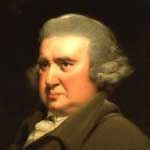
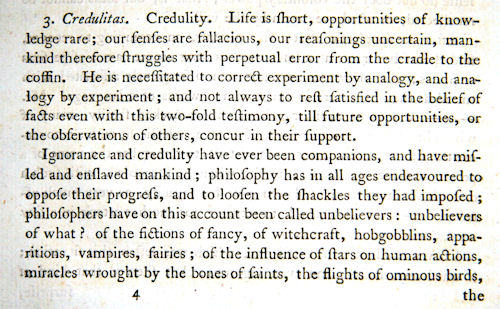
6 thoughts on “The Other Darwin Genius”